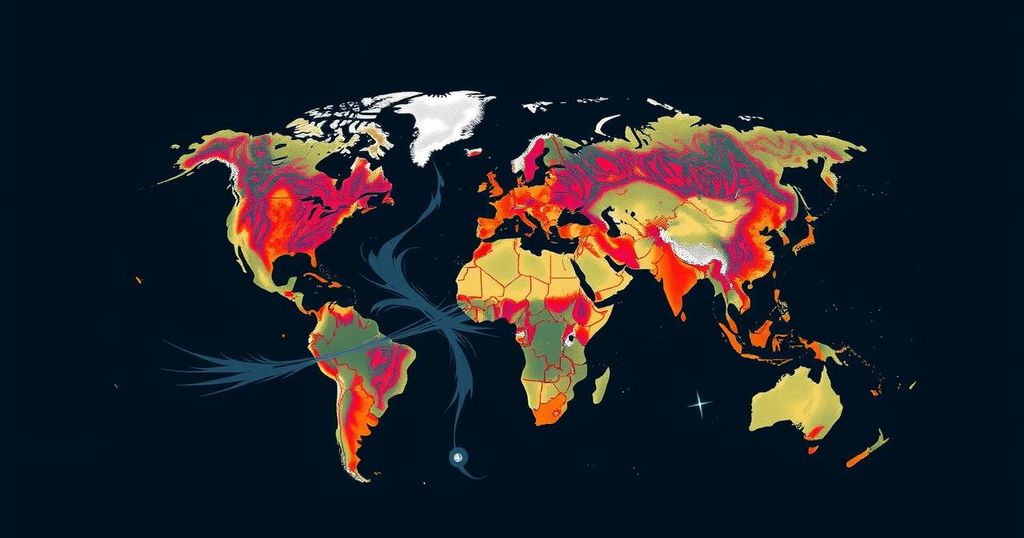A £3 million study, RESHAPE, has initiated research into the impact of climate change on global healthcare systems. The project involves collaboration with various universities and local organizations in countries such as Malawi and Vietnam. It aims to assess how healthcare systems are coping with extreme weather events and seeks to develop strategies to enhance their resilience against ongoing environmental challenges.
Researchers have commenced an innovative study aiming to examine the impact of climate change on the resilience of healthcare systems globally. This £3 million initiative, entitled RESHAPE – RESilience in HeAlth Post-Extreme weather events, unites scholars and communities worldwide to analyze how various populations are reacting to environmental challenges that jeopardize the operations of hospitals and healthcare providers. The research team is actively engaged in regions such as Malawi, Vietnam, Tanzania, and Uganda, all of which are experiencing an increase in extreme weather patterns attributed to climate change, threatening essential healthcare services for millions. Dr. Brahim Herbane of De Montfort University Leicester, who specializes in business continuity, is leading the project team and will visit each locale to collaborate with local partners and stakeholders as the study evolves. He stated, “The premise is that the effects of climate change are increasing, and we are seeing more extreme weather events which will then impact on healthcare. The research looks at how healthcare systems currently mitigate those impacts and how we can co-create more resilient systems.” Dr. Herbane emphasized the significant opportunities this study offers for enhancing healthcare systems in low and middle-income countries while also learning resilience strategies from regions in the global south that frequently face extreme weather. During a preliminary visit to Malawi, he witnessed firsthand the challenges posed by climate change when his team encountered severe rainfall during a community meeting, which ultimately led to a flooded hospital tour. The primary objective of this research, spearheaded by the University of East Anglia (UEA), is to illuminate the challenges faced by these healthcare systems and identify actionable strategies for mitigating adverse impacts. Dr. Herbane remarked, “We are looking at what is in place on the ground to respond to and recover from extreme weather events,” and expressed hopes of establishing an international standard for healthcare resilience and reshaping resilience policies in healthcare. This project is financially supported by the National Institute for Health and Care Research (NIHR) through UK international development funding aimed at bolstering global health research. Collaborating institutions on this endeavor include Kamuza University of Health Sciences and Patient and Community Welfare Foundation in Malawi; Mwanza Intervention Trials Unit in Tanzania; Mbarara University of Science and Technology in Uganda; Hanoi University of Public Health in Vietnam; along with the University of Leeds and the London School of Hygiene and Tropical Medicine.
Climate change is increasingly becoming a significant factor influencing health systems globally. The rising frequency of extreme weather events undermines healthcare infrastructure, particularly in vulnerable and low-income regions. This research addresses the urgent need to understand how climatic impacts can compromise the delivery of healthcare services, while also exploring strategies to improve the resilience of these systems. RESHAPE seeks to formulate a framework for enhancing healthcare preparedness and response to extreme environmental changes, providing essential insights applicable across various contexts.
In conclusion, the RESHAPE project stands as a crucial undertaking aimed at investigating the effects of climate change on healthcare system resilience in multiple countries. By engaging with health professionals and communities directly affected by extreme weather events, the project aims to formulate effective strategies for enhancing healthcare response capabilities. The outcomes of this research will not only contribute to the resilience of health systems in low and middle-income countries but also provide valuable insights that can be generalized to address healthcare challenges around the world.
Original Source: www.dmu.ac.uk







